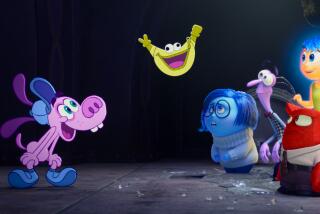Silent Movie’s Festival Opens a Trove of Rare Treasures
The Silent Movie’s fourth annual film festival, always a treasure-trove, opens tonight at 8 with “Nell Gwyn” (1926), with Dorothy Gish in the title role as the mistress of Charles II. The theater, which normally screens on Wednesdays, Fridays and Saturdays, will present a different program at 8 each night through Sept. 5.
Under the lively yet subtle direction of Britain’s Herbert Wilcox, Gish is an exquisite Nell, the Drury Lane orange peddler who caught the eye of aging, rakish Charles II (Randle Ayrton). Gish’s Gwyn has an uninhibited, hoydenish spirit that glows with an innate sensitivity and intelligence.
The way Wilcox tells it in this handsome, beautifully photographed British production, Gwyn and Charles were caught up in a genuine love story, not merely in a sexual liaison. You have to suspect that Gish was inspired by the enduring romance of Marion Davies and William Randolph Hearst, so strongly is her Gwyn in the effervescent, selfless and loyal spirit of Davies. The film, which Wilcox remade in 1934 with his wife, Anna Neagle, could use a tad more dramatic adversity but is nonetheless a charmer.
The Silent Movie’s Lawrence Austin preserved the 1928 “The Dove” (Tuesday) just in time, for its final reel had started to deteriorate. Its romantic tale couldn’t be more familiar: A gambler (Gilbert Roland) falls for a dancer (Norma Talmadge) at a cabaret in an exotic clime (here, the Mediterranean coast) only to incur the jealous wrath of the gross local bigwig (an over-the-top Noah Beery).
It was the second of three teamings of Roland and Talmadge, whose reported off-screen romance was so torrid that Roland called a males-only press conference at the Hollywood Athletic Club to squelch the rumor that Talmadge’s estranged husband, producer Joe Schenck, had not in fact had the handsome star castrated. It is of even greater interest as one of the few films by the stylish Roland West, master of the tracking shot, whose career and life were forever blighted when he became a prime suspect in the still-mysterious death of comedian Thelma Todd in 1935.
It’s fortunate that director Herbert Brenon is represented by the delightful, often-revived 1924 “Peter Pan” (Wednesday), starring Betty Bronson in the title role, because he can’t do much with the tedious 1929 “The Rescue” (Thursday), a notably awkward adaptation of the Joseph Conrad novel, which finds adventurer Ronald Colman in the Java Sea becoming entangled with a tempestuous married beauty (Lily Damita, best known as the first wife of Errol Flynn), while trying to protect a rajah from rebellious natives.
Luckily, “The Rescue” is preceded on Thursday by Cecil B. DeMille’s 1917 “The Woman God Forgot.” An archetypal early silent spectacle with absurdly elaborate costuming and a heavily declamatory style of emoting--it can’t really be called acting--it is a vivid, campy pleasure in which opulent opera star Geraldine Farrar (who made a series of pictures with DeMille) plays Montezuma’s daughter, who falls in love with one of Cortez’s handsome captains (Wallace Reid).
Friday brings a Buster Keaton evening, highlighted by one of his early talkies, “Free and Easy” (1930), in which Keaton was clearly feeling anything but as an agent who attempts to promote the Hollywood career of a young actress (Anita Page) only to become captivated by filmmaking.
Loretta Young plays the adopted daughter of Pagliacci-like circus performer Lon Chaney in the 1928 “Laugh, Clown, Laugh” (Saturday). Typically, Chaney conceals his passionate love for Young, who’s attracted to a younger man.
It will be followed by Thomas Ince’s fascinating, newly restored 1914 “The Wrath of the Gods,” in which an American seaman (Frank Borzage, soon to become a major director) is shipwrecked on a remote Japanese island, where he falls in love with the daughter (Tsuru Aoki) of a local fisherman (Sessue Hayakawa). Never mind that the family is cursed because an ancestor defiled a temple, with the result that no one wants to marry Aoki; Borzage simply produces a cross and a Bible. Nonetheless, their love for each other has a literally cataclysmic impact. “The Wrath of the Gods” is primitive and emotionally extravagant but has terrific energy and scope.
Information: (213) 663-2389.
More to Read
Only good movies
Get the Indie Focus newsletter, Mark Olsen's weekly guide to the world of cinema.
You may occasionally receive promotional content from the Los Angeles Times.









